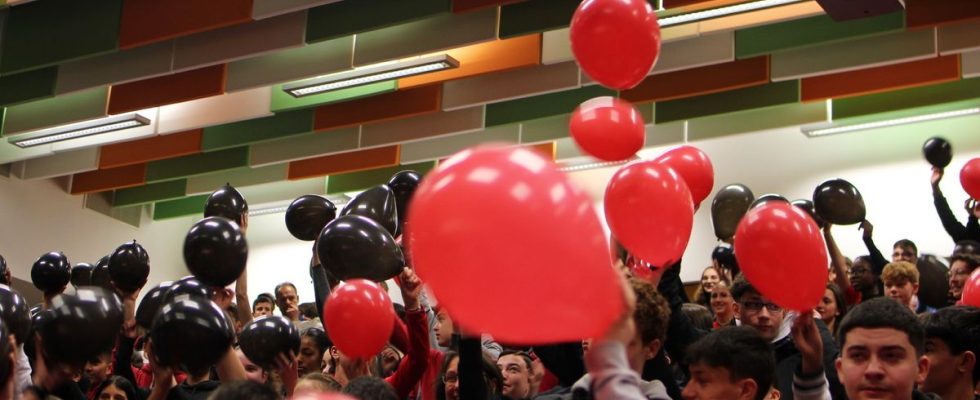His leg has been locked in a long navy blue splint for only a few days. But already, Shaïa is impatient to be able to resume sport. The 14-year-old was injured in a handball game last weekend. “I’ve been doing handball for five years and it’s very important to me. It’s a passion, something a bit addictive. I am sad to have injured myself, because I will not be able to finish the season. I miss it already, I don’t know how I’m going to last a month. This student from Jean-Monnet College in Janzé was one of the 300 4th and 3rd year students invited by the Ille-et-Vilaine department and Stade Rennais on Thursday March 4 as part of the “Move” project.
Initiated by the professional football club, this program aims promote physical activity and “an active lifestyle”. Born in 2021 when France sometimes lived confined and slumped in its sofa, the operation has often turned to the public furthest from the sports fields with the sole aim of getting them moving. “The body is an incredible machine but it needs to move so it has to be maintained. We spend way too much time sitting down,” explains Dr. Sophie Cha. Alongside the sports doctor, Stade Rennais had called on a renowned ambassador. Triple European champion, triple world champion and triple Olympic champion, the French handball player Luc Abalo tried to convince teenagers of the need to move. “The most important thing is to have fun. Sport doesn’t have to bother you. The best solution is to play sports with your friends, to make it a friendly moment, ”says the one who just retired from sport a month ago.
The message of the famous winger of the France team passes easily to part of the audience. “I’ve done a lot of sports since I was little. I feel that I need it”, testifies Johan. The teenager plays football “three to four times a week” and regularly takes his bike to move around Janzé. At the other end of the room, Klervie nods. The 15-year-old girl regularly runs. But unlike many of her comrades, she is not registered in any club. “I go alone or with friends when I have free time. I got into it because I no longer had any activity. I knew I had to get back into sport because it was good for my health. I started running”. Today, Klervie jogs every week. “I like going with a girlfriend. We can talk, spend some time together. When she can’t do her session, the teenager says she feels “missed”. The harms are however known: obesity, blood pressure, cardiovascular risks and diabetes await the least active.
“I’m a little lazy”
All the college students sitting in the room do not share the same enthusiasm for sports, especially among girls, who seem to be more likely not to practice any activity. “I used to do gymnastics and swimming but I stopped when I moved. I know that sport is good for your health but I’m a little lazy. I feel like I don’t have time to do it, ”says Ocella, a 3rd grade student.
“I stopped dancing because I got injured and frankly, I don’t miss it. I walk 10 minutes to come to college and that’s it. I know it’s not enough but I don’t want to. It pisses me off to hear that you absolutely have to exercise. There are people who need it. Me, I have the impression not, ”assumes Marie.
However, all the studies carried out over the past fifty years tend to show the opposite. Since the arrival of the car and electricity, the French population has tended to become encrusted, its youth first. Result: adolescents lost 25% of endurance between 1971 and 2011. In France, 80% of college students do not practice the daily hour of exercise recommended by doctors.

The worst could even be to come. With the Covid and the confinements, some young people have stopped moving, posing the serious threat of a reduction in life expectancy. “Me too, it happened to me. I spent my days sitting on my sofa watching series, ”concedes Luc Abalo, as if to show that top athletes do not escape laziness. “Sometimes you don’t want to. But you just have to give yourself a boost, to find yourself a challenge, ”says the Olympic champion.
Faced with the repeated injunctions of their parents, their teachers and our society to want them to play sports, adolescents nevertheless draw up a damning observation: to run, dance or play, they are sorely lacking in time. “We come home at 5:30 p.m. after a day of lessons, we have lots of homework to do. I would like to do more sport, but I feel like I don’t have the time, ”regrets Briac. Microphone in hand, a student dares the question in front of the whole assembly. “Shouldn’t we stop classes earlier to be able to play sports? asks the teenager. Embarrassed laughter from the faculty. These same adults who encourage them to move but ask them to sit still all day.
Shorten classes to play sports?
The practice is however common among our German and Scandinavian neighbors, who devote a large part of their afternoon to sports practice. Response from the college principal? “We are working on it. A quarter of an hour of reading already exists. Why not set up a quarter of an hour to move? he asks aloud. It will probably take a little more to get a whole generation back in shape. Doctor Cha’s advice will therefore be simple: “Since we have been in kindergarten, we tell children to stop fidgeting, to stay seated. But in 2023, you’re being told to move more, so go ahead and do it! Take every little opportunity to move, to get up, to walk.”

